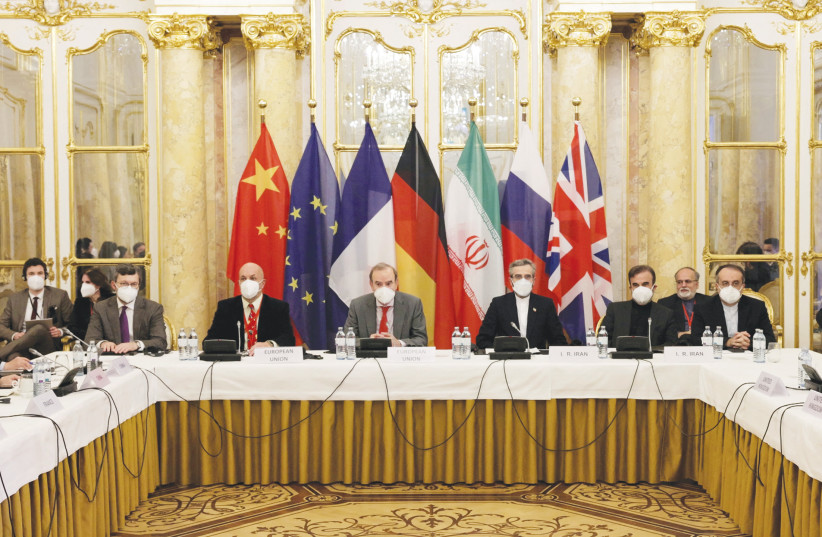The United States is less likely to return to the 2015 Iran nuclear deal as long as Tehran holds four US citizens hostage, US Special Envoy for Iran Rob Malley said on Sunday.
“It is very hard for us to imagine getting back into the nuclear deal while four innocent Americans are being held hostage by Iran,” Malley told Reuters in an interview.
However, Malley also repeated the longstanding US position that the hostages and the nuclear deal are two separate issues.
“So even as we’re conducting talks with Iran indirectly on the nuclear file we are conducting, again indirectly, discussions with them to ensure the release of our hostages,” Malley said in Vienna, where negotiations to bring Washington and Tehran back into compliance with the deal are being held.
The four US citizens include Iranian-American businessman Siamak Namazi, 50, and his father Baquer, 85, both of whom have been convicted of “collaboration with a hostile government.” The former remains in prison, while his father was released on medical grounds but is barred from leaving Iran.

The others are environmentalist Morad Tahbaz, 66, who is also British, and businessman Emad Shargi, 57
“Senior Biden administration officials have repeatedly told us that although the potential Iranian nuclear and hostage deals are independent and must be negotiated on parallel tracks, they will not just conclude the nuclear deal by itself,” said Jared Genser, pro bono counsel to the Namazi family.
“Otherwise, all leverage to get the hostages out will be lost,” he added.
Iran is also holding British, French, German, Austrian and Swedish citizens hostage, with Western powers saying they are political prisoners.
Iran state news agency IRNA came out against conditioning a return to the Joint Comprehensive Plan of Action, as the 2015 nuclear agreement is known, on the release of American hostages.
“Such irrelevant preconditions by Washington will make reaching a deal in Vienna difficult,” IRNA said.
World powers and Iran are in the eighth round of negotiations to revive the JCPOA, with the Iranians refusing to be in the same room as the Americans.
The JCPOA restricted Iran’s uranium enrichment – but not its missile program or funding of proxy groups – while gradually lifting sanctions on the Islamic Republic.
THE US left the deal in 2018, and Iran has since enriched uranium to 60% and launched advanced centrifuges, along with its ongoing proxy warfare throughout the Middle East.
Iranian Foreign Minister Hossein Amir-Abdollahian said on Monday that he could consider direct negotiations with the US “if we reach a point in the negotiation where a good agreement requires a dialogue.”
Malley said he would welcome direct talks.
Western parties to the negotiations – France, Germany, the UK and the US – have lamented the slow pace of the talks, saying that within weeks the JCPOA will no longer be relevant.
Iranian Foreign Ministry Spokesman Saeed Khatibzadeh said on Monday, “The main reason behind the slow pace of the Vienna nuclear talks is the United States’ lack of readiness.”
The Iranian delegation met with the Europeans, Russians and Chinese to continue drafting parts of the agreement, but “some of the outstanding issues still remain,” the Russian delegation’s leader Mikhail Ulyanov tweeted.
Iran has demanded that all post-JCPOA sanctions be lifted, and that the US guarantee that future presidents will not leave the deal, something that the Biden administration cannot legally do.
Malley’s deputy Richard Nephew, a sanctions expert, left the delegation officially over the weekend, with no official announcement. He also removed his title from his Twitter bio. Malley and Nephew reportedly disagreed on the direction of the negotiations.
When Nephew joined the team last year, Iranian lawmaker Ahmad Naderi called him one of the “architects of the oppressive sanctions,” and that his part in delegation shows “Americans’ hatred of Iran is not limited to Republicans or Democrats.”
Also over the weekend, South Korea announced that it had paid Iran’s dues of $18 million to the United Nations, thus reinstating Iran’s UN voting rights.
The announcement came on Friday, a day after Iran was the only country to object to a UN General Assembly resolution led by Israel and Germany opposing Holocaust denial.
South Korea made the payment after the US approved the release of frozen Iranian funds earlier this month, in an exception to US sanctions on Iran. It came in addition to a $63-million payment to Iranian-government-linked Dayyani Holdings.
Iran says South Korea owes about $7 billion for oil cargo, which it has not paid since former US president Donald Trump left the Iran Deal in 2018 and imposed “maximum pressure” sanctions.
